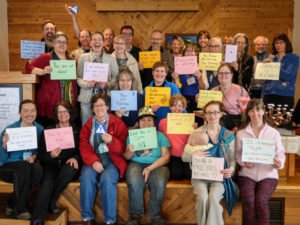Membership and Outreach
 We want our congregations to be warm, lively, vital, and sustainable. For this to happen, we need to ensure that the people who come through our doors feel welcomed by our programs and practices. Helping visitors become committed members requires intentionality, and sometimes change.
We want our congregations to be warm, lively, vital, and sustainable. For this to happen, we need to ensure that the people who come through our doors feel welcomed by our programs and practices. Helping visitors become committed members requires intentionality, and sometimes change.
When we invite people to our home, we take care to make them comfortable, feed them appropriately, and show them that we’re happy they’ve come. Sometimes we set our own preferences aside in favour of our guests’ needs. It’s similar in our congregations, where the way we greet and welcome visitors can make a profound difference in the way they experience their time with us.
To share with newcomers and new members: What We Wish People Knew About Unitarian Universalism, Rev. Steven Epperson
Developing a Culture of Welcome and Inclusion
Our Unitarian Universalist values call us to hospitality and ask us to consider how we can expand our welcome, so that those we’ve not yet met and who are unlike others in our community can feel comfortable with us. We aspire to be radically inclusive, and that means taking intentional steps to expand our understanding of who “we” are and how we welcome each other to the table. In addition to exploring the resources here, connect with the Congregational Life team for ideas, support, and shared energy.
UUMOC Call to Action on Racial Justice
The Unitarian Universalist Ministers of Canada (UUMOC) have issued a call to action on racial justice. At their annual meeting last year, UUMOC members held a conversation about the recent white supremacy teach-ins that had originated in the United States, and the idea of a call to action arose. A task force was created and spent much of the past year gathering resources, deciding what points to emphasize, and seeking input from UUMOC as a whole. The resulting document calls on “all Canadian Unitarian and Unitarian Universalist congregations to pledge as member societies to initiate intentional actions of conscience around racial justice issues”. Congregations are encouraged to discern their own unique action and endorse or affirm it at their next business meeting.
As an accompanying resource, the task force has assembled a list of 10 actions for racial justice to take on both an individual level and as Canadian UU congregations. Congregants are invited to choose from the list or to pursue their own activity or initiative and to share news of their actions with the task force which is creating a resource list to share with congregations.
Read the complete document: UUMOC Racial Justice Call to Action, April 2018 (pdf)
General resources
- Tips for Intentionally Inclusive Congregations
- General Resources to Help Nurture Inclusivity
- Radical Inclusion, a 2013 address by Rev. Dr. Mark Morrison-Reed, asks good questions and shows some ways to move toward greater diversity of all kinds in our communities.
- Spiritual Practice for Privileged Fragility
Youth and young adults
Read more about our youth ministries and young adult ministries.
Lesbian, gay, bisexual, queer, trans, and gender-nonconforming people
- The Welcoming Congregation program supports Unitarian Universalist congregations in becoming more welcoming and inclusive of people of all sexual orientations and gender identities.
Welcoming Congregations are those which have completed a Unitarian Universalist Association (UUA) program, taken significant and concrete steps to become more welcoming of sexual and gender minorities (especially in the areas of education, community life, and outreach), and have voted to be recognized by the UUA as a Welcoming Congregation.
We are proud that 99 percent of our members belong to Welcoming Congregations.
- Learn about the Welcoming Congregation program.
- The commitment to being welcoming is always ongoing. Learn about the Welcoming Congregation Refresher Program.
- There are always ways to deepen your congregation’s welcome.
- Living the Welcoming Congregation is the UUA’s program for congregations that already have a basic understanding of lesbian, gay, bisexual, transgender, and queer identities and issues and are already committed to welcoming people of all sexual orientations and gender identities.
The Membership Process
Congregations need programs and material to help them welcome and orient newcomers and integrate them into our faith communities. Newcomers want to know more about who we are and what we believe. They are interested in hearing members describe why Unitarian Universalism is important to them and the effect it has had in their lives. They are also looking for opportunities to examine their own stories in the light of our Unitarian Universalist tradition and heritage. Programs should give newcomers a chance to meet and connect with longer-term members.
- Do your bylaws say what they need to about membership? See the UUA’s guide to writing bylaws (pdf), especially pages 15–21.
- (PDF), a report by the UUA’s Commission on Appraisal
- Membership Integration Assessment (pdf): A self-assessment tool to help you look at your congregation’s strengths and weaknesses in welcoming guests and including new members
- Many of our congregation have programs that are run periodically to help orient and welcome newcomers. Here is one.
The UU Association of Membership Professionals brings together congregational volunteers and staff, whether paid or unpaid, who are passionate about the ministry of membership. It offers a wide variety of resources and educational opportunities to members, and hosts book discussion groups that are open to all!
Outreach
Social media, the Internet, building signage, congregational involvement in community events: all of these are tools to help people learn about your community and its values.
If you are looking for ways to be more visible in the larger community, please connect with your Congregational Life staff and explore these resources.
- We Are Unitarian Universalists, a video from the UUA
- Outreach Revolution Network
Join the network of UUs who are turning their ministry outward, doing outreach work in their congregations. Each month, you’ll receive an email care package with our most recent original Growing Unitarian Universalist blog post, recommended blog posts with insights on outreach from other sources, and customizable social media graphics you can use to share the UU message, with your own congregation’s name and community’s needs in mind. Whether you do communications, social media, websites, membership, social justice, or marketing and promotion, whether you are a lay leader or professionals alike, find your place with others who see the power of reaching out.
- Sign up here to get Outreach Revolution monthly updates
Your online presence
-
-
- Find guidance on using social media in your congregation
- Check out this Checklist for Congregational Websites
-
Your community profile
-
- Participate in local events (such as pride marches and environmental festivals) that fit your congregation’s strengths. Bring a banner or wear T-shirts identifying your congregation!
- Collaborate with other groups and faith communities that share your congregation’s interests and values.
